By: debbie lynn elias
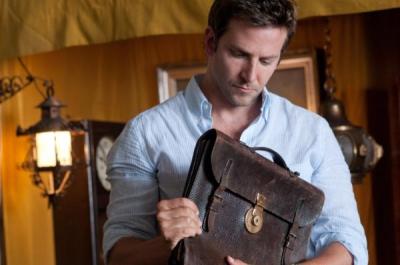
I love THE WORDS. I love the look. I love the feel. I love the intrigue of the narrative construction and plot. I love that, much like a novel itself, it allows you to imagine, interpret and draw your own conclusions. Written and directed by my fellow Philadelphians, Brian Klugman and Lee Sternthal, and with a stellar cast that includes another member of the “City of Brotherly Love Club”, Bradley Cooper, as well as Jeremy Irons, Dennis Quaid, Ben Barnes, Michael McKean, Ron Rifkin and Zoe Saldana, THE WORDS is an emotionally powerful and intelligent film that tugs at your heart and your own moral code and ethical sensibilities. In other words, it makes you feel. It makes you think.
There is nothing that Rory Jansen loves more than words. Words mean everything to him. The words of love from his wife Dora that encourage him and reflect her belief in his talents and gifts, the words that he devours with every page that he reads, the words that he himself writes, and even the words that the world believes he wrote but which, in fact, are not his. Those last words are the words he loves most of all. But they arenft his words. Those words belong to an Old Man. An Old Man who was once young and in love, an old man who also loved words, an old man whose hopes and dreams have long been silenced and he robbed of his public claim to his own life story.
Best-selling author Clay Hammond also loves words, and the power and acclaim that the right words can bring. He loves the words of Rory Jansenfs life story, the words of Rory Jansenfs book, the story of the Old Man, the words of the Old Manfs life.
But at what price do all these WORDS come? And for whom? Does overwhelming ambition trump ethics or love? Are THE WORDS and the love of THE WORDS more precious than the love that inspires them? Do THE WORDS give one the right to blur – or erase – the lines of fiction and non-fiction? Where do one man’s words begin and another man’fs end? And whose WORDS are we hearing?
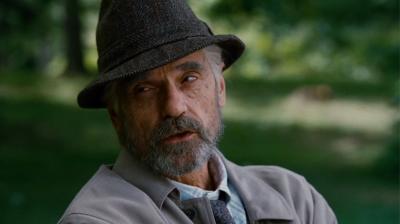
As the Old Man, Jeremy Irons is flawless. The subtle nuance that he brings to the character with just one look is as telling as one volume of an encyclopedia. Tall and lanky, you see the pride with which he once carried himself, but Irons adds a slight stoop to the shoulders and sadness to the eyes that hints of life’s burdens and sorrow. When he tells his tale to Rory, there are points where Irons sits back, erect, head high, using the physical to emphasize certain points; very telling as to specifically what is important to the Old Man. And then his vocal intonations! With the bulk of his scenes as lengthy monologues, Iron’s voice is perfectly modulated and unfaltering until his ire is raised and then he roars as only Irons can. You feel his anger, his pain, his rage, his melancholy, his mourning.
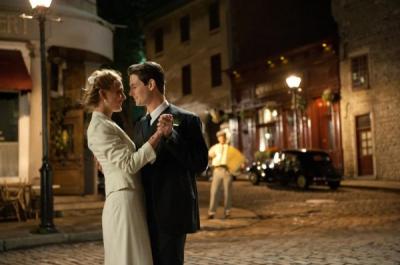
With no dialogue, Ben Barnes has to rely on physical expressiveness for his performance as the Young Man aka the young Jeremy Irons and wonderfully does so. His smile is infectious and lights up the screen just as his chemistry with Nora Arnezeder who plays his young wife, Celia, leading to an emotionally heart-wrenching intensity. Initially concerned taking on a role with no dialogue, on reading the script, Barnes was nevertheless hooked. “I thought it would be a problem because as an actor you have your expression and you have the words on the page. But then Brian and Lee called me up and said, ’We’ll improvise these scenes. If we find something magical along the way, we’ll keep it in. And if it’s terrible, Jeremy Irons will voice over you. [laughing] So, we got a bit of each. It was very freeing because I didn’t have to worry about what the next line was at any given time. I could say whatever I wanted and if it was stupid they would turn the volume down. It was actually very freeing, earnest, organic.”
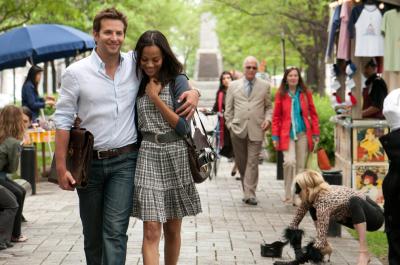
Bradley Cooper is perfection in casting. Although himself worried about portraying the somewhat duplicitous aspect of Rory, he found his focal point by tapping into the fact that “[Rory] was really a good writer. Otherwise, it was just so delusional. But I loved the idea that he was just ’impatient’.” Cooper brings a youthful hunger to Rory, but also a “cheating” sensibility that he captures through his eyes and a subtle pursing of the lips. He gives Rory a presence that we’ve all seen before – a guilty person hiding a secret, hiding the fact that they cheated. He captures that look perfectly which is so important as it shows he has a conscience. And then the camera captures him in intimate moments with Irons. Cooper has a rapt look on his face like a kid being read his favorite bedtime story. Touching, poignant and effectively mesmerizing.
Then there’s Dennis Quaid. As Clay Hammond, he is slick, even tinged with a slight seediness. There’s more to him than what we are seeing and Quaid gives the sense it’s something Hammond wants to keep hidden, which only adds to the creative imagination of the audience in deciphering what is truth and what is fiction. Where Quaid loses me, however, is a make-out session with an allegedly obsessive grad student, Daniella, played by Olivia Wilde. Very uncomfortable to watch. Very awkwardly executed on screen. In a word – Blegh! But here’s where the mind really races in terms of story. It is with Daniella’s probing questions on Rory Jansen and the Old Man that we get a sense of urgency and vested personal interest in the situation. Her questions are not merely those of an over-zealous lusty grad student. These are personally driven, which give pause for thought on the numerous ways the story can actually play out, adding even more intrigue to this ever-unfolding page turner.
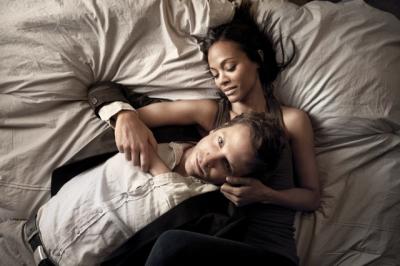
While clear that the characters of Rory and Dora are designed to essentially mirror the Young Man and his wife Celia, with Rory and the Young Man facing the dilemma of love of words versus love of life/wife, I have to say that the beauty of the emotion that Barnes and Nora Arnezeder bring to the characters and the story rings so much truer and purer than the chemistry between Zoe Saldana and Cooper, who for me, just felt like college buddies.
Perfectly punctuating the film are little cameos from Michael McKean, JK Simmons as Rory’s blue collar, salt of the earth father and Ron Rifkin as Rory’s publisher, with scenes between Simmons/Cooper and Rifkin/Cooper real cornerstones in the emotional structure of the story and the character of Rory.
Skillfully crafted by Brian Klugman and Lee Sternthal both on the page and on screen, THE WORDS unfolds through multiple narratives that are captivating, compelling and artfully interwoven into a masterfully rich dramatic tapestry. While we are allowed a suspension of disbelief as to the “truth” of the story of Jansen, and that of the Old Man, as now written by Hammond, THE WORDS also allows us the supposition and sense that the entire film could be a fictional novel itself; that Rory Jansen and his fraudulent conduct was never real and neither was the Old Man; that Clay Hammond really is a creative genius with a very fertile imagination and his latest best seller is purely fictional and not based on a “true” incident. It is this very fact “that the script is so complicated” that appeals to Cooper. Like any great book, the story allows the audience to think outside the box. The script is set up perfectly to open that door. A nice, intelligent touch that will allow everyone to walk away with their own interpretation.
Also directed by Klugman and Sternthal, who make their feature debut with THE WORDS, one might think that co-directing might present a challenge to them, especially after already spending almost a decade on the project, but such is not the case. With Klugman working more with the actors and Sternthal more technically oriented, according to Klugman, “”We’ve known each other for so long. We have a little bit of a shorthand…and we both have different things that we do well.” Seamlessly jumping in, Sternthal agrees. “We do have a shorthand. I think itfs in the preparation. We did a lot of preparation so that we were always on the same page. We weren’t coming at people from two different directions. Like he wasn’t saying to an actor one thing and then me coming in and say the opposite.”
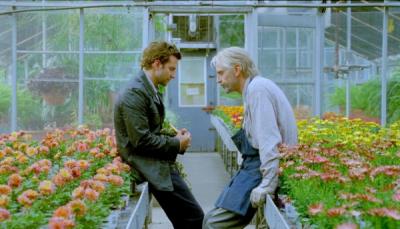
A real standout and potential Oscar nominee with THE WORDS is cinematographer Antonio Calvache. When it comes to Calvache’s work, it is transportive. Thanks to the grain and grit of the Parisian sequences (not to mention the “authenticity” shooting in Montreal provides as a period location), we are transported and immersed in the 1940’s post-War period, almost as if in a dreamlike state. The palette is washed out, yellowed like aged wallpaper with only one or two vibrant pops of color or – as with a fingerprint on a manuscript, intense inky black – which when combined with the graininess of the stock, gives the emotional gravitas of memories recalled with some bits and pieces still as vivid as if they happened yesterday. The look that Calvache creates, compounded with Jeremy Irons’ performance as he tells his story to Rory, makes one fervently believe that the Old Man’s story is real. But then, when viewed within the film as a whole, can also be believed to be coming from one’s imagination thanks to “present day” sequencing which is beautifully executed. Scenes set in the story portion of Clay Hammond are sleek, slick and polished; crisp, sharp, clean, minimalist while those of Rory & Dora’s life are richly hued, beautifully lit – open, bright, hopeful, love the streams of sunbeams through windows – but also intense and claustrophobic when Rory is at his laptop working in the night with the only light being the desk light and the computer screen, painting a rich emotional picture. And we see the warmth of the Jansens’ life morph into some slick crispness with Rory’s success, dovetailing the visuals of the Hammond scenes. It’s a wonderful dichotomous structure for the imagination.
What sets THE WORDS apart, however, is the emotion created within the Parisian scenes. Poignant, touching, heartbreaking. You feel the ebullience and magic of the young love of the Young Man and Celia, and you feel the pain and the loss. That entire segment is so glorious that it could be lifted from THE WORDS and be its own stand alone short film. Well written, well lensed, well cut. Superbly done. And some of those camera angles used by Calvache just make the sequence that much more powerful, more “dreamlike” and memory laden.
Pacing and balancing the converging stories is Leslie Jones editing. Impeccably done with rapier precision, imagery and story walk a fine line as we move between the eras and the men with their stories.
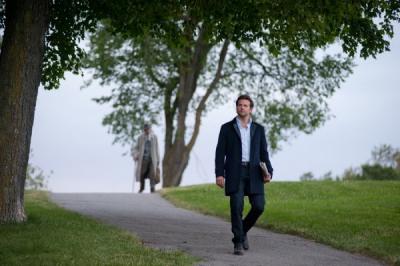
THE WORDS is a film that, given its narrative structure, could have been a disaster. This is not the type of story or construct that can be quickly tossed on paper and up onto a screen. The care and dedication of Klugman and Sternthal, in particular, is evidenced every step of the way. Characters are well constructed and interesting, “chapter lineage” is well connected and thought through, editing and pacing moves like that of a voracious reader immersed in a good book who is anxiously but thoughtfully turning the pages to see what comes next, cinematography is glorious, Montreal as Paris/NY is stunningly beautiful and immersive, and then there’s the Parisian scenes and Jeremy Irons. WOW!
THE WORDS is of such high caliber that there aren’t enough no words to describe it………you have to feel it, experience it…like reading a good book.
Rory Jansen – Bradley Cooper
Old Man – Jeremy Irons
Clay Hammond – Dennis Quaid
Young Man – Ben Barnes
Dora Jansen – Zoe Saldana
Written and Directed by Brian Klugman and Lee Sternthal.











